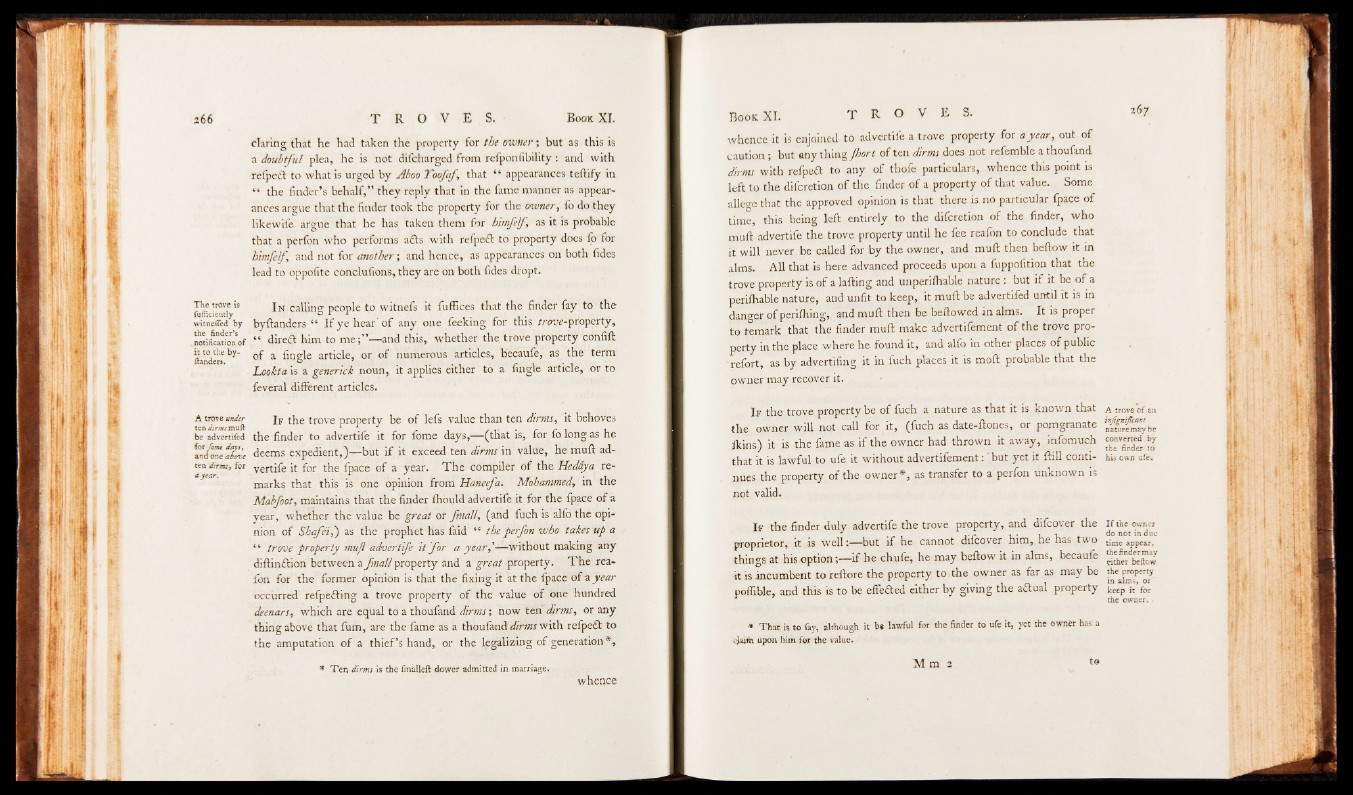
266
daring that he had taken the property for the owner; but as this is
a doubtful plea, he is not difcharged from refponlibility: and with
relpetft to what is urged by Abort Toofaf, that “ appearances teftify in
“ the finder’ s behalf,” they reply that in the fame manner as appearances
argue that the finder took the property for the owner, fo do they
likewife argue that he has taken them for himfetf, as it is probable
that a perfon who performs a£ts with refpeft to property does fo for
himfetf, and not for another; and hence, as appearances on both fides
lead to oppofite conclufions, they are on both fides dropt.
The trove is j N caq;na- people to witnefs it fuffices that the finder fay to the
fufficiently o r r r . . r , .
witnefled by byftanders 44 If ye hear of any one leeking for this trove-property,
noüficathjrujf “ direft him to me;” — and this, whether the trove property confift
it to the by- f a flngie article o r cf numerous articles, becaufe, as the term
itanders. ° l jg r . . .
Lookta is a generick noun, it applies either to a lingle article, or to
feveral different articles.
A troee undtr jF the trove property be of lefs value than ten dir ms, it behoves
ten dirms mult r r . , s v • r r i 1
be advertifed the finder to advertile it for fome days,— (that is, for lo long as ne
Woneahc-i't deems expedient,)— but if it exceed ten dirms in value, he muft ad-
ten dirm, for ygrtife it for the fpace of a year. The compiler of the Heddya remarks
that this is one opinion from Haneefa. Mohammed, in the
Mabfoot, maintains that the finder fhould advertife it for the fpace of a
year, whether the value be great or fmall, (and fuch is alfo the opinion
of Shctfei,') as the prophet has laid “ the perfon who takes up a
“ trmie property muß advertife it fo r a year,’— without making any
diftinftion between a fmall property and a great property. The rea-
lon for the former opinion is that the fixing it at the fpace of a year
occurred refpefting a trove property of the value of one hundred
deenars, which are equal to a thoufand dirms; now ten dirms, or any
thing above that fum, are the fame as a thoufand dirms with refpeft to
the amputation of a thief’s hand, or the legalizing of generation*,
* T e n dirms is the finalleft dower admitted in marriage.
whence
whence it is enjoined to advertife a trove property for a year, out of
caution ; but any thing Jhort of ten dirms does not refemble a thoufand
dirms with refped to any of thofe particulars, whence this point is
left to the diferetion of the finder of a property of that value. Some
allege that the approved opinion is that there is no particular fpace of
time, this being left entirely to the diferetion of the finder, who
muft advertife the trove property until he fee reafon to conclude that
it will never be called for by the owner, and muft then beftow it in
alms. All that is here advanced proceeds upon a fuppofition that the
trove property is of a lading and unperifhable nature : but if it be of a
perishable nature, and unfit to keep, it muft be advertifed until it is in
danger of perilhing, and muft then be bellowed in alms. It is proper
to remark that the finder muft make advertifement of the trove property
in the place where he found it, and alfo in other places of public
' refort, as by advertifing it in fuch places it is moft probable that the
owner may recover it.
If the trove property be of fuch a nature as that it is known that
the owner will not call for it, (luch as date-ftones, or pomgranate
lkins) it is the fame as if the owner had thrown it away, infomuch
that it is lawful to ufe it without advertifement: but yet it ftill continues
the property of the owner*, as transfer to a perfon unknown is
not valid.
If the finder duly advertife the trove property, and difeover the
proprietor, it is we ll:— but if he cannot difeover him, he has two
things at his o p t i o n i f he chufe, he may beftow it in alms, becaufe
it is incumbent to reftore the property to the owner as far as may be
poffible, and this is to be effefted either by giving the aftual property
♦ T h a t is to fay, although it be lawful for the finder to ufe it, yet the owner has a
upon him for the value.
A trove o f an
infignijicant
nature may be
converted by
the finder to
his own ufe*
I f the owner
do not in due
time appear,
the finder may
either bellow
the property
in alms, o r '
keep it for
the owner.
M m 2